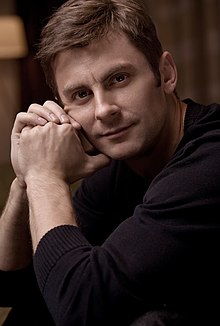
The men's horizontal bar competition was one of eight events for male competitors of the artistic gymnastics discipline contested in the gymnastics at the 2004 Summer Olympics in Athens. The qualification and final rounds took place on August 14 and August 23 at the Olympic Indoor Hall. There were 79 competitors from 29 nations, with nations competing in the team event having up to 5 gymnasts and other nations having up to 2 gymnasts. The event was won by Igor Cassina of Italy, the nation's first victory in the horizontal bar and first medal of any color in the event since 1928. Paul Hamm took silver, the United States' first horizontal bar medal since 1992. Bronze went to Isao Yoneda of Japan, the once-dominant nation's first medal in the event since 1984.

The men's rings competition was one of eight events for male competitors of the artistic gymnastics discipline contested in the gymnastics at the 2004 Summer Olympics in Athens. The qualification and final rounds took place on August 14 and August 22 at the O.A.C.A. Olympic Indoor Hall. There were 77 competitors from 28 nations, with nations competing in the team event having up to 5 gymnasts and other nations having up to 2 gymnasts. The event was won by Dimosthenis Tampakos of Greece, the nation's first victory in the rings since 1896 and second overall. Yordan Yovchev of Bulgaria took silver, while Jury Chechi of Italy earned bronze. All three men had previously won a medal in the event; they were the 9th, 10th, and 11th men to win multiple rings medals.

The men's vault competition was one of eight events for male competitors of the artistic gymnastics discipline contested in the gymnastics at the 2004 Summer Olympics in Athens. The qualification and final rounds took place on August 14 and August 23 at the Olympic Indoor Hall. There were 79 competitors from 30 nations, with nations competing in the team event having up to 5 gymnasts and other nations having up to 2 gymnasts. The event was won by Gervasio Deferr of Spain, the third man to successfully defend an Olympic title in the vault and sixth man to win multiple medals of any color. Latvia and Romania each earned their first men's vault medals, with Evgeni Sapronenko's silver and Marian Drăgulescu's bronze, respectively.

The men's vault competition at the 2008 Summer Olympics was held on August 9 and 18 at the Beijing National Indoor Stadium. The eight competitors with the highest scores in qualifying, among the gymnasts electing to make two vaults, proceeded to the men's vault finals. There, each gymnast performed two vaults; the scores from the final round determined final ranking. There were 16 competitors from 13 nations that made a second vault attempt. The event was won by Leszek Blanik of Poland, the nation's first victory in the men's vault. Blanik was the seventh man to win multiple medals in the event, adding to his 2000 bronze. France earned its first medal in the event with Thomas Bouhail's silver. Anton Golotsutskov of Russia took bronze, putting the nation back on the podium after a one-Games absence.
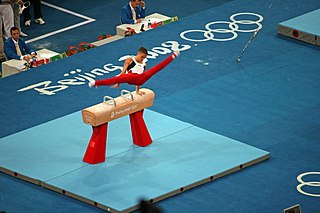
The men's pommel horse competition at the 2008 Summer Olympics was held on August 17 at the Beijing National Indoor Stadium. The eight competitors with the highest scores in qualifying proceeded to the men's pommel horse finals. There, each gymnast performed again; the scores from the final round determined the final ranking. There were 76 competitors from 27 nations that competed on the pommel horse, with nations in the team event entering up to 5 gymnasts while other nations could enter up to 2. The event was won by Xiao Qin of China, the nation's second consecutive and third overall victory in the pommel horse. The other two medals went to nations that had never earned a medal in the event before: Filip Ude of Croatia took silver while Louis Smith of Great Britain finished with bronze.
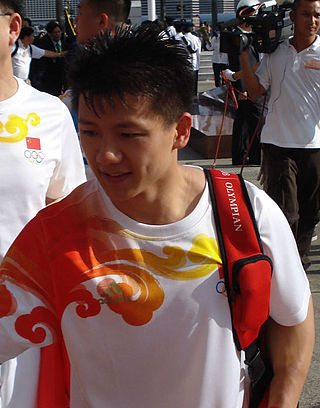
The men's rings competition at the 2008 Summer Olympics was held on August 18 at the Beijing National Indoor Stadium. The eight competitors with the highest scores in qualifying proceeded to the men's rings finals. There, each gymnast performed again; the scores from the final round determined final ranking. There were 70 competitors from 25 nations that competed on the rings, with nations in the team event entering up to 5 gymnasts while other nations could enter up to 2. The event was won by Chen Yibing of China, the nation's first victory in the rings since 1984. Yang Wei, also of China, took silver. Bronze went to Oleksandr Vorobiov, the nation's first medal in the event.

The men's parallel bars competition at the 2008 Summer Olympics was held on August 9 and 19 at the Beijing National Indoor Stadium. The eight competitors with the highest scores in qualifying proceeded to the men's parallel bars finals. There, each gymnast performed again; the scores from the final round determined the final ranking. There were 75 competitors from 27 nations that competed on the parallel bars, with nations in the team event entering up to 5 gymnasts while other nations could enter up to 2. The event was won by Li Xiaopeng of China, the first man to win three medals in the parallel bars as well as the first man to win two non-consecutive gold medals in the same apparatus. Yoo Won-Chul of South Korea took silver. Anton Fokin won Uzbekistan's first parallel bars medal in its debut as an independent nation.

The men's horizontal bar competition at the 2008 Summer Olympics was held on 9 and 19 August at the Beijing National Indoor Stadium. The eight competitors with the highest scores in qualifying proceeded to the men's horizontal bar finals. There, each gymnast performed again; the scores from the final round determined final ranking. There were 76 competitors from 27 nations that competed on the horizontal bar, with nations in the team event entering up to 5 gymnasts while other nations could enter up to 2. The event was won by Zou Kai of China, the nation's first victory in the horizontal bar. Jonathan Horton won silver, the United States' second consecutive Games with a silver medalist in the horizontal bar. Germany's Fabian Hambüchen won the first of his three medals in the event with bronze.

The men's vault competition was one of eight events for male competitors in artistic gymnastics at the 2000 Summer Olympics in Sydney. The qualification and final rounds took place on September 16 and 25 at the Sydney SuperDome. There were 80 competitors from 31 nations; nations competing in the team event could have up to 5 gymnasts in the vault, while other nations could have up to 2 gymnasts. The event was won by Gervasio Deferr of Spain, the nation's first medal in the men's vault. Poland also earned its first medal in the event, with Leszek Blanik's bronze. Silver went to Alexei Bondarenko of Russia.

The men's parallel bars competition was one of eight events for male competitors in artistic gymnastics at the 2000 Summer Olympics in Sydney. The qualification and final rounds took place on September 16 and 25 at the Sydney Super Dome. There were 81 competitors from 30 nations; nations competing in the team event could have up to 5 gymnasts in the vault, while other nations could have up to 2 gymnasts. The event was won by Li Xiaopeng of China, the nation's first victory in the parallel bars. Lee Joo-Hyung earned South Korea's first medal in the event with his silver. Russia also received its first medal since the dissolution of the Soviet Union, with Alexei Nemov's bronze.
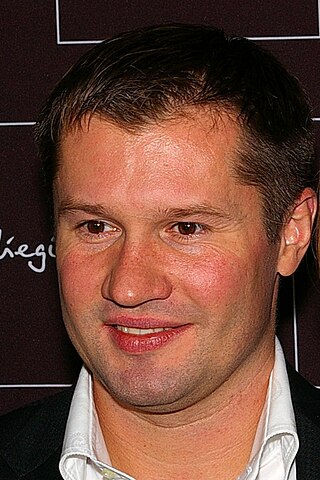
The men's horizontal bar competition was one of eight events for male competitors in artistic gymnastics at the 2000 Summer Olympics in Sydney. The qualification and final rounds took place on September 16 and 25 at the Sydney Super Dome. There were 79 competitors from 28 nations; nations competing in the team event could have up to 5 gymnasts in the vault, while other nations could have up to 2 gymnasts. The event was won by Alexei Nemov of Russia, the nation's first post-Soviet victory in the horizontal bar. Nemov, a bronze medalist in 1996, was the 10th man to win multiple medals in the horizontal bar. Benjamin Varonian earned France's first medal in the event since 1976 with his silver. Lee Joo-Hyung won South Korea's first medal in the event with his bronze.

The men's vault competition was one of eight events for male competitors in artistic gymnastics at the 1996 Summer Olympics in Atlanta. The qualification and final rounds took place on July 20, 22 and 29th at the Georgia Dome. There were 105 competitors from 31 nations, with nations in the team event having up to 7 gymnasts and other nations having up to 3 gymnasts. The event was won by Alexei Nemov of Russia, the nation's first victory in the men's vault after the dissolution of the Soviet Union. Yeo Hong-Chul gave South Korea its third consecutive podium appearance in the event, this time with silver. Vitaly Scherbo of Belarus was the fifth man to win multiple medals in the vault, adding bronze to his 1992 gold.

The men's parallel bars competition was one of eight events for male competitors in artistic gymnastics at the 1996 Summer Olympics in Atlanta. The qualification and final rounds took place on July 20, 22 and 29th at the Georgia Dome. There were 106 competitors from 31 nations, with nations in the team event having up to 7 gymnasts and other nations having up to 3 gymnasts. The event was won by Rustam Sharipov of Ukraine, the nation's first victory in the men's parallel bars after the dissolution of the Soviet Union. Jair Lynch earned the United States' first medal in the event since 1984 with his silver. Defending champion Vitaly Scherbo earned bronze for Belarus. He was the sixth man to win multiple medals in the parallel bars.
The men's parallel bars competition was one of eight events for male competitors in artistic gymnastics at the 1992 Summer Olympics in Barcelona. The qualification and final rounds took place July 27, 29 and August 2 at the Palau dels Esports de Barcelona. There were 93 competitors from 25 nations, with nations in the team event having 6 gymnasts while other nations could have up to 3 gymnasts. The event was won by Vitaly Scherbo of the Unified Team, the third time in four Games that a Soviet or former Soviet gymnast won the rings. Li Jing of China earned silver. There was a three-way tie for third, with Igor Korobchinski of the Unified Team, Guo Linyao of China, and Masayuki Matsunaga of Japan each receiving bronze medals. They were the first medals for China in the parallel bars.

The men's horizontal bar competition was one of eight events for male competitors in artistic gymnastics at the 1992 Summer Olympics in Barcelona. The qualification and final rounds took place on July 27, 29 and August 2 at the Palau dels Esports de Barcelona. There were 93 competitors from 25 nations, with nations in the team event having 6 gymnasts while other nations could have up to 3 gymnasts. The event was won by Trent Dimas of the United States, the nation's first victory in the event since 1932 and fourth gold medal in the horizontal bar overall. Andreas Wecker of Germany earned silver in the nation's return after unification; the first medal for "Germany" in the event since 1952. The Unified Team's Grigory Misutin took bronze.

The men's parallel bars competition was one of eight events for male competitors in artistic gymnastics at the 1988 Summer Olympics in Seoul. The qualification and final rounds took place on September 18, 20 and 24th at the Olympic Gymnastics Hall. There were 89 competitors from 23 nations, with nations competing in the team event having 6 gymnasts and other nations having up to 3 gymnasts. The event was won by Vladimir Artemov of the Soviet Union, bracketing the 1984 boycott with gold medal wins for the Soviets; Valeri Liukin took silver, as well. Sven Tippelt of East Germany took bronze.

The men's horizontal bar competition was one of eight events for male competitors in artistic gymnastics at the 1988 Summer Olympics in Seoul. The qualification and final rounds took place on September 18, 20 and 24th at the Olympic Gymnastics Hall. There were 89 competitors from 23 nations, with nations competing in the team event having 6 gymnasts and other nations having up to 3 gymnasts. There were ties for both gold and bronze medals. The Soviet Union took two golds, as Vladimir Artemov and Valeri Liukin finished even at the top spot; they were the Soviets' first gold medals in the horizontal bar since 1968, and moved the Soviet Union past the United States and Switzerland into second most all-time golds in the event. Bronze medals went to Holger Behrendt of East Germany and Marius Gherman of Romania, the first medal in the event for both nations. It was the first time since 1964 that Japanese gymnasts competed but did not win the event.
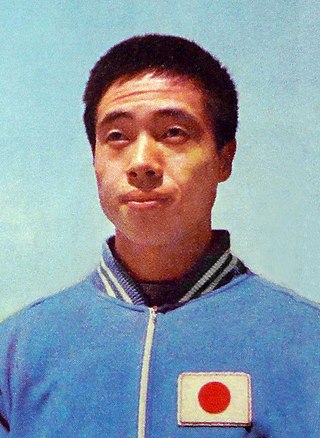
The men's parallel bars competition was one of eight events for male competitors in artistic gymnastics at the 1972 Summer Olympics in Munich. The qualification and final rounds took place on August 27, 29 and September 1 at the Olympiahalle. There were 112 competitors from 26 nations ; nations entering the team event had 6 gymnasts while other nations could have up to 3 gymnasts. Japan reached the height of its success in the event this year: putting four men into the six-man final and sweeping the medals. Sawao Kato earned Japan's third consecutive gold medal in the parallel bars, tying Switzerland for most golds all-time; Kato would break that tie in 1976 with his second gold medal. Shigeru Kasamatsu took silver while Eizo Kenmotsu earned bronze.

The men's parallel bars competition was one of eight events for male competitors in artistic gymnastics at the 1976 Summer Olympics in Montreal. The qualification and final rounds took place on July 18, 20, and 23rd at the Montreal Forum. There were 90 competitors from 20 nations, with nations competing in the team event having 6 gymnasts while other nations could have up to 3 gymnasts. The event was won by Sawao Katō of Japan, the first man to successfully defend an Olympic title in the parallel bars—and, as of the 2016 Games, still the only one to do so. It was the fourth consecutive victory by a Japanese gymnast in the event, breaking a tie with Switzerland for most all-time. Japan was unable to repeat its 1972 medal sweep, as nations were now limited to two finalists each. Nikolai Andrianov of the Soviet Union took silver, while Mitsuo Tsukahara of Japan earned bronze, missing a 1–2 finish for Japan by .025 points.

The men's parallel bars competition was one of eight events for male competitors in artistic gymnastics at the 1968 Summer Olympics in Mexico City. There were 117 competitors from 28 nations, with nations in the team competition having up to 6 gymnasts and other nations entering up to 3 gymnasts. The event was won by Akinori Nakayama of Japan, the nation's second consecutive victory in the parallel bars event, tying Germany and the Soviet Union for second-most all-time behind Switzerland at three gold medals. It was the second of four straight Games that the parallel bars would be won by a Japanese gymnast. Mikhail Voronin took silver and Viktor Klimenko took bronze to put the Soviet Union back on the podium after a one-Games absence.
